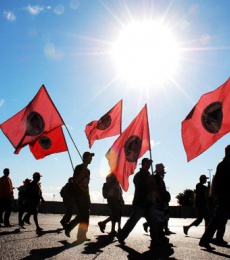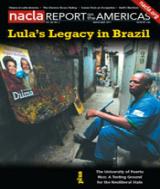Peasants Launch Manifesto for Agrarian Reform After Historic Meeting
The rural social movements, which held a meeting earlier this week in Brasilia, launched a manifesto in defense of agrarian reform, rural development with the end of inequality, production and access to healthy foods, for agro-ecology and ensuring expansion of social rights for rural workers.

The most representative organizations of the rural areas in Brazil considered the gathering "a historic moment, a space qualified, with leaders of major organizations in the countryside awaiting the membership and commitment to this process."
For the complete Manifesto, click here.

 Transcription of the talk by João Pedro Stedile, of the MST, in the meeting between Dilma and representatives of civil society held on January 26 2012 during the Thematic Social Forum in Porto Alegre.
Transcription of the talk by João Pedro Stedile, of the MST, in the meeting between Dilma and representatives of civil society held on January 26 2012 during the Thematic Social Forum in Porto Alegre. While visiting the MST Agrarian Reform Store in the public market of Porto Allegre (RS), Jose Graziano da Silva, General Director of the United Nations Organization for Food and Agriculture (FAO) saw the successful products derived from settlements for agrarian reform and family farming.
While visiting the MST Agrarian Reform Store in the public market of Porto Allegre (RS), Jose Graziano da Silva, General Director of the United Nations Organization for Food and Agriculture (FAO) saw the successful products derived from settlements for agrarian reform and family farming.

 La Via Campesina (a sister organization of MST) presents a political platform to the federal government of Brazil which includes emergency measures, medium term measures, and strategies for the development and strengthening of family-based and peasant agriculture. The proposals are listed below.
La Via Campesina (a sister organization of MST) presents a political platform to the federal government of Brazil which includes emergency measures, medium term measures, and strategies for the development and strengthening of family-based and peasant agriculture. The proposals are listed below. The report amending the Forest Code, presented by congressman Aldo Rebelo (Communist Party of Brazil [PCdoB]) and approved by the House of Representatives Special Commission benefits the large landholders of Agribusiness.
The report amending the Forest Code, presented by congressman Aldo Rebelo (Communist Party of Brazil [PCdoB]) and approved by the House of Representatives Special Commission benefits the large landholders of Agribusiness.